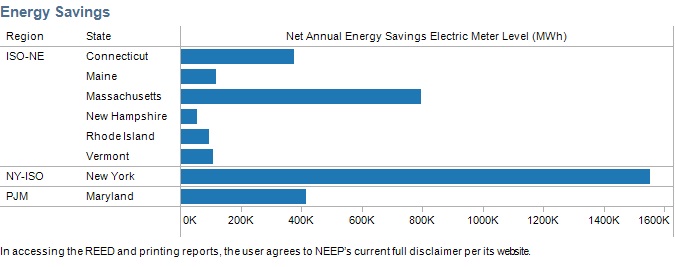By Cecily McChalicher | Wed, November 20, 13
 Cecily McChalicher, REED Manager
Cecily McChalicher, REED ManagerThe REED Program Year 2011 Annual Report (released this week) extracts the underlying stories and themes from REED's prodigious pool of energy efficiency program data. If you're new to REED, you might be asking, so what does this all mean? Well, remember that trite cliché that ever so wisely advises us to compare apples to apples? That saying happens to be an accurate analogy for the goal REED is striving towards. REED currently provides transparency in reported energy efficiency data as a first step towards its long-term goal to supply consistent, apples-to-apples, reporting of energy efficiency program information and results. With the launch of the Regional Energy Efficiency Database (REED) in February, energy efficiency stakeholders now have a one-stop resource to access energy efficiency program impact data from the Northeast and Mid-Atlantic states. REED is hosted by NEEP through its Regional EM&V Forum, and is the first database in the country to publicly provide data on energy efficiency program savings and associated costs, avoided CO2 and other air pollutants, and job impacts across multiple jurisdictions. REED currently provides transparency in reported energy efficiency data as a first step towards its long-term goal to supply consistent, apples-to-apples, reporting of energy efficiency program information and results. REED users can generate state-level energy efficiency reports and download underlying program-specific data that can be used to analyze, compare or aggregate the impacts of state energy efficiency programs. The database currently includes 2011 electric and gas energy efficiency program data for 8 states: Connecticut, Maine, Maryland, Massachusetts, New Hampshire, New York, Rhode Island and Vermont. Annual energy efficiency data for program year 2012 from these states, along with Delaware and the District of Columbia, will be added to REED this fall. The transparent and consistent reporting of energy efficiency impacts makes REED particularly valuable, as policymakers increasingly look to energy efficiency investments as a least-cost strategy to meet state and regional energy, economic and environmental policy goals. REED provides a reliable source of energy efficiency data that allows policymakers and other stakeholders to better understand the impact of energy efficiency programs across the region and have greater confidence in the credibility of energy efficiency as a resource. REED is an important step towards creating a common platform for the use of energy efficiency data. In order for energy efficiency impacts to be truly comparable, consistent methods must be used to calculate energy efficiency impacts in addition to consistent reporting. To this end, the Regional EM&V Forum issued its Regional EM&V Methods Guidelines in 2010, which helped inform the recently released US Department of Energy’s Uniform Methods Project Energy Efficiency Savings Protocols for key energy efficiency measures. Recognizing that disparate methods are currently used to calculate energy efficiency impacts, REED includes links to supporting documents in each state, including energy efficiency plans, technical reference manuals, and EM&V guidance documents.
 This screenshot from the REED website shows the wide range of 2011 Net Annual Energy Savings (MWh) across all participating states.
This screenshot from the REED website shows the wide range of 2011 Net Annual Energy Savings (MWh) across all participating states.NEEP plans to issue a REED Annual Report this summer based on the program year 2011 data that will include a regional profile of 2011 energy efficiency program impacts and will highlight key similarities and differences in reported data across the states that may indicate where greater effort is needed to help increase consistency in reported data (e.g., reporting definitions/categories, underlying EM&V methods, differences in program design, and other factors). This analysis will also help to inform and share best practices across the region. REED is a product of the Regional EM&V Forum, facilitated by NEEP, and was developed with the assistance of the Boston-based Peregrine Energy Group. It is funded by US DOE, US EPA and the EM&V Forum states. Please contact REED Manager Cecily McChalicher for more information.
